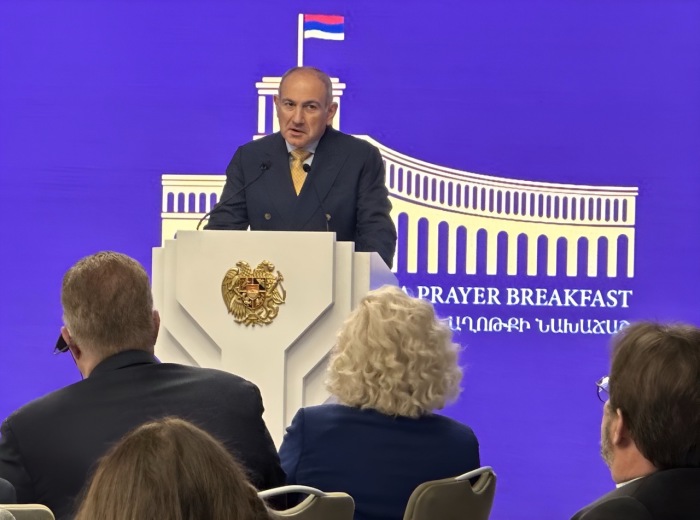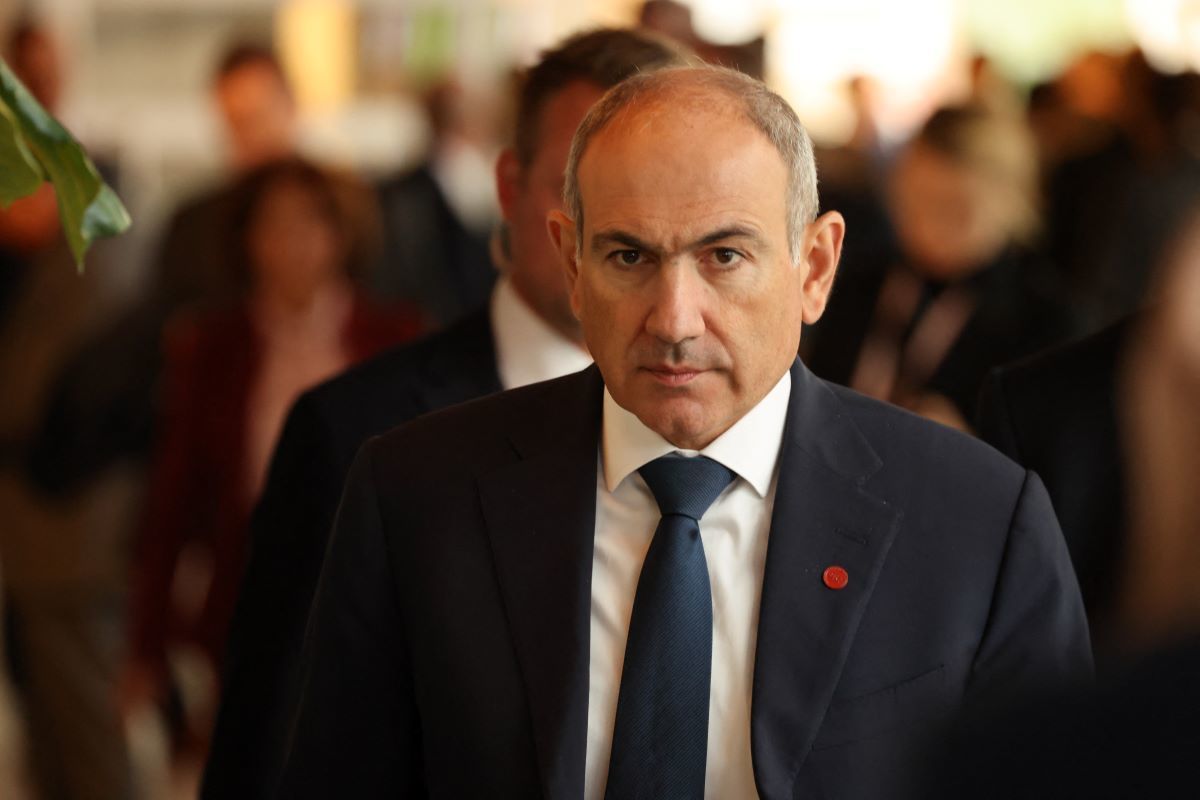
YEREVAN, Armenia — Prime Minister Nikol Pashinyan, under criticism from rights groups over his government's treatment of senior clergy from Armenia's national church, received strong praise from American and British Evangelical leaders after highlighting his record at the country's first national prayer breakfast on Saturday.
Pashinyan, who rose to power in 2018 amid a wave of anti-government protests, told attendees at the inaugural Republic of Armenia Prayer Breakfast that this year was a significant one for Armenia's history, marking the establishment of peace for the first time since independence in 1991.
He said the Aug. 8 peace agreement and memorandum of understanding signed with Azerbaijan at the White House occurred between his participation at the National Prayer Breakfast in Washington in February and Armenia's own inaugural gathering, calling the timing spiritually meaningful.
Pashinyan recited Psalm 32:1 and said the event was a moment to reflect on the relationship between God and the state.
Jim Garlow, the former senior pastor of Skyline Church in Southern California and author who was among the international guests, praised the prime minister for reciting the Bible passage from memory in Armenian.
"I have been with 13 Heads of State over the past few years, but this is the FIRST time I have ever heard a Head of State quote by memory an entire chapter of the Bible," Garlow, who has led prayer gatherings in Washington, wrote on Facebook, describing it as "powerful."
"Armenian Prime Minister Nikol Pashinyan first saw a New Teatament when he was a 7th grader when the Soviet empire fell," Garlow wrote. "He has committed many of the Psalms to memory. He closed his speech quoting Psalm 29 by memory (in Armenian). Powerful."
Mervin Thomas, president of the United Kingdom-based persecution watchdog group Christian Solidarity Worldwide, also described Pashinyan as "an inspiration" for quoting scripture from memory.
Other speakers included World Evangelical Alliance General Secretary Rev. Botrus Mansour, a leader from the Anglican Church in Armenia and Catholic bishops from the country.
Also in attendance were Vicky Hartzler, chair of the U.S. Commission on International Religious Freedom, and its vice chair, Asif Mahmood.
The two-day event, held in the nation's capital on Friday and Saturday, drew more than 300 guests from Armenia and abroad, including faith leaders from Christian, Jewish, Muslim, Yezidi and Assyrian communities.
The gathering also featured remarks by Sudanese-born religious freedom advocate Mariam Ibraheem, according to a press release from the organizers.
Armenian President Vahagn Khachaturyan also attended on the first day.
Organizers said the event was conceived and executed by Armenian civil society groups to promote reconciliation, cooperation and dialogue rooted in the country's Christian identity.
Stepan Sargsyan, chair of the organizing committee, said it was not a government event but rather a spiritual initiative to "look forward in faith and prayer." The participation of various Christian denominations, the statement noted, signaled a collective moral vision.
In the lead-up, Pashinyan's confirmed presence at the prayer breakfast sparked criticism due to his ongoing dispute and his government's arrest of church leaders, which has garnered attention from Western media figures.
Tensions between Pashinyan and leaders of the Armenian Apostolic Church have escalated this year, as his government has arrested at least three archbishops on coup-related charges and other Pashinyan critics.
In September, Archbishop Mikael Ajapahyan was convicted of calling for the overthrow of the government and sentenced to two years in prison. His arrest followed the June arrest of Archbishop Bagrat Galstanyan, who led an opposition movement called Sacred Struggle. Galstanyan, the bishop of a border region impacted by cessions to Azerbaijan, was arrested with 13 others and charged with orchestrating a plot to overthrow the government.
Last month, Bishop Mkrtich Proshyan of the Diocese of Aragatsotn and 12 clergymen were arrested. Armenia's Investigative Committee stated that Proshyan was charged with coercing citizens to participate in public gatherings, obstructing electoral rights, and misusing his office to commit large-scale theft.
In a press conference held after the event Saturday in Yerevan, the Switzerland-based group Christian Solidarity International accused Armenia's government of blocking its request to visit four imprisoned Armenian Apostolic Church leaders and more than two dozen detained church supporters.
CSI's Director of Public Advocacy Joel Veldkamp said CSI sought to evaluate their condition, review the charges and meet their families and lawyers.
The clergymen include Galstanyan, Ajapahyan, Proshyan and Father Garegin Arsenyan. CSI also named businessman Samvel Karapetyan and 22 other detained church supporters, saying it considers them political prisoners.
Veldkamp said the case against Galstanyan and 12 others appeared to rely on falsified evidence, and that Archbishop Ajapahyan had been sentenced to two years in prison for a speech that prosecutors had previously declined to pursue. "This is a clear sign of political interference," he said.
A report by the Armenian Center for Political Rights states that Catholicos Karekin II, the spiritual head of the Armenian Apostolic Church, hosted an international conference in Bern, Switzerland, from May 26 to 28, titled "Religious Freedom: Preserving the Armenian Spiritual, Cultural, and Historical Heritage in Artsakh/Nagorno-Karabakh."
The conference concluded with a statement calling for the return of ethnic Armenians to Artsakh and the release of Armenian prisoners held in Baku following Azerbaijan's invasion in 2023 that displaced 120,000 people and essentially emptied the region of its Armenian population.
The day after the May event, Prime Minister Pashinyan said during a government meeting that Armenian churches had been "turned into junkrooms," a remark that drew criticism from Armenian Apostolic Church clergy, according to the report, which claims that in the days that followed, Pashinyan escalated verbal attacks on church leaders through daily comments that included insults and obscene language.
Accusing Pashinyan of abandoning Artsakh to a military takeover by Baku in 2023 and its 120,000 residents, who remain displaced, his opponents believe that the Aug. 8 peace agreement amounts to a surrender to the demands of Azerbaijan and Turkey, both backed by the United States for strategic advantage against Russia in the Caucasus.
Dr. John Eibner, president of CSI, said the absence of the Armenian Apostolic Church, the country's national church, at the prayer breakfast was significant.
Veldkamp pointed to Karapetyan's arrest in June, which came just hours after Pashinyan had criticised him publicly on Facebook for defending the church.
"It is transparent that Mr. Karapetyan is in jail because he exercised his free speech rights to defend the Armenian Apostolic Church," he said.
Veldkamp accused Pashinyan of trying to replace the Catholicos of All Armenians, the church's top cleric, calling it a violation of religious freedom.
He also rejected accusations made by government allies and Western groups that elements of the church act as agents of Russia, saying no evidence had been presented to support such claims. He called them "innuendo, slander and a false justification for an attack on religious freedom."
Dr. Asif Mahmood, a physician and human rights activist who serves as vice chair of USCIRF, was among the attendees at the prayer breakfast. As someone who has been an ally of Armenia for two decades, he told The Christian Post he finds the arrests of church leaders "concerning."
"When I heard that clergy had been arrested, the first thing that comes to anyone's mind, especially people like me who are working day-in-and-day-out on religious freedom, that this is an encroachment of the Church and their voice has been shut," Mahmood, who was speaking in his personal capacity, said.
"When I say the arrest of clergy is not right, this is against the freedom of religion and they should be released, I will also say at the same time that the Church has certain limitations," he added. "And I don't think the Church should be propagating or instigating people for political reasons. Everybody has the right to practice their citizenship right of protest. But they should come out of that particular position. If you walk out, take that robe off, and you can protest and you can speak. But raising a voice from the podium of the Church would not be acceptable."
Like many advocates who traveled from across the globe to attend the prayer breakfast, Mahmood said his reason for attending wasn't to please the government or church leaders.
"My goal is not to please government. My goal is not to please clergy. My goal is to help and assist the state of Armenia," he said. "I believe the religious freedom, strengthening and people's freedom of speech and expression is a much bigger weapon for Armenia to separate itself from its neighboring states [and show] that Armenia is a democracy. On top of that, Armenia is the oldest Christian nation. In the oldest Christian nation, the Church is being marginalized. That is kind of concerning."
News Source : https://www.christianpost.com/news/evangelicals-offer-praise-for-armenia-pm-after-he-recites-bible.html
 Your post is being uploaded. Please don't close or refresh the page.
Your post is being uploaded. Please don't close or refresh the page.





